Nur 169 test 3 guide - Study guides, Class notes & Summaries
Looking for the best study guides, study notes and summaries about Nur 169 test 3 guide? On this page you'll find 6 study documents about Nur 169 test 3 guide.
All 6 results
Sort by
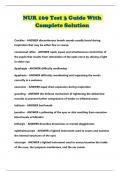
-
NUR 169 Test 3 Guide With Complete Solution
- Exam (elaborations) • 21 pages • 2024
- Available in package deal
-
- $9.99
- + learn more
NUR 169 Test 3 Guide With Complete Solution...
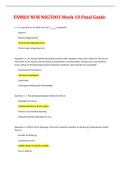
-
FAMILY NUR NSG5003 Week 10 Final Guide (GRADED A) Questions and Answers | 100% VERIFIED.
- Exam (elaborations) • 53 pages • 2021
-
- $10.99
- + learn more
FAMILY NUR NSG5003 Week 10 Final Guide 1. It is important to not dilate the eye if is suspected. Cataract Macular degeneration Acute closed-angle glaucoma Chronic open-angle glaucoma Quest ion 2. 2. An 18-year-old female patient presents with repeated urinary tract infections. She has no risk factors in her history, and her physical examination is unremarkable. She also has a normal pelvic exam. Which of the following should be obtained if anatomic abnormalities are suspected? Ultrasound of the ...
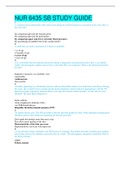
-
NUR 6435 SB STUDY GUIDE
- Exam (elaborations) • 28 pages • 2021
-
- $17.39
- + learn more
NUR 6435 SB STUDY GUIDE 1. A congenital heart abnormality often discovered during the newborn period is coarctation of the aorta. How is this assessed? By comparing right and left femoral pulses By comparing right and left pedal pulses By comparing upper and lower extremity blood pressures By auscultating an audible bruit in the carotid arteries 2. A child who can stack a maximum of 5 blocks is probably: 1 yr of age 15 months of age 2 years of age 3 years of age 3. A 6 yr old chi...
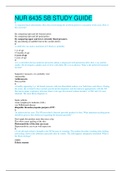
-
NUR 6435 SB STUDY GUIDE | LATEST VERSION
- Exam (elaborations) • 28 pages • 2021
-
- $12.49
- + learn more
NUR 6435 SB STUDY GUIDE 1. A congenital heart abnormality often discovered during the newborn period is coarctation of the aorta. How is this assessed? By comparing right and left femoral pulses By comparing right and left pedal pulses By comparing upper and lower extremity blood pressures By auscultating an audible bruit in the carotid arteries 2. A child who can stack a maximum of 5 blocks is probably: 1 yr of age 15 months of age 2 years of age 3 years of age 3. A 6 yr old chi...
![NSG5003 FAMILY NUR|FAMILY NURNSG5003 Week 10 Final Guide 2020/2021...[Recent]](/docpics/5f58a55c7eb76_815588.jpg)
-
NSG5003 FAMILY NUR|FAMILY NURNSG5003 Week 10 Final Guide 2020/2021...[Recent]
- Study guide • 53 pages • 2020
-
- $11.39
- 1x sold
- + learn more
FAMILY NUR NSG5003 Week 10 Final Guide 1. It is important to not dilate the eye if ____ is suspected. Question 2. 2. An 18-year-old female patient presents with repeated urinary tract infections. She has no risk factors in her history, and her physical examination is unremarkable. She also has a normal pelvic exam. Which of the following should be obtained if anatomic abnormalities are suspected? Question 3. 3. The pathophysiological hallmark of ACD is: Question 4...
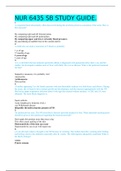
-
NUR 6435 SB STUDY GUIDE (UPDATE)
- Summary • 29 pages • 2021
-
- $13.49
- + learn more
NUR 6435 SB STUDY GUIDE. 1. A congenital heart abnormality often discovered during the newborn period is coarctation of the aorta. How is this assessed? By comparing right and left femoral pulses By comparing right and left pedal pulses By comparing upper and lower extremity blood pressures By auscultating an audible bruit in the carotid arteries 2. A child who can stack a maximum of 5 blocks is probably: 1 yr of age 15 months of age 2 years of age 3 years of age 3. A 6 yr old ch...

Do you wonder why so many students wear nice clothes, have money to spare and enjoy tons of free time? Well, they sell on Stuvia! Imagine your study notes being downloaded a dozen times for $15 each. Every. Single. Day. Discover all about earning on Stuvia


